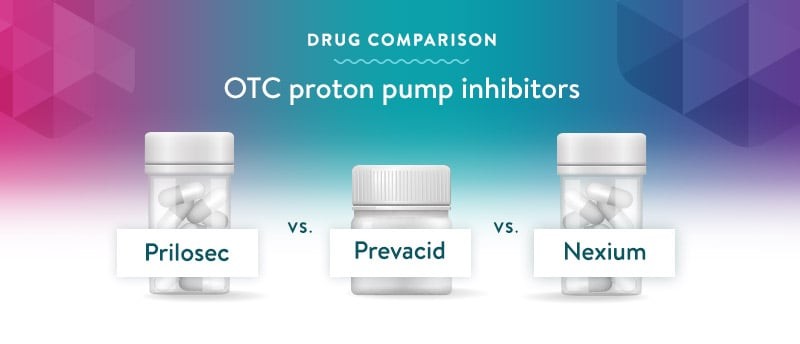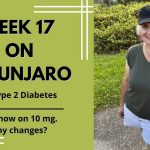
Contents
Review: Prilosec vs. Nexium
Prilosec and Nexium are used to treat gastroesophageal reflux disease (GERD) and other digestive conditions related to overproduction of stomach acid. They belong to a family of medications called proton pump inhibitors (PPIs), which reduce acid production at a cellular level.
- Other PPIs include lansoprazole (Prevacid), rabeprazole (Aciphex), and pantoprazole (Protonix).
Omeprazole and esomeprazole have similar chemical compositions, resulting in shared side effects and drug interactions. However, esomeprazole is usually more potent than omeprazole due to a slight chemical difference.
Side effects of these drugs include diarrhea, nausea, vomiting, headaches, and others. Long-term use of PPIs may interfere with vitamin B12 absorption and cause lower magnesium levels, leading to skeletal problems and increased risk of heart attacks.
Prilosec and Nexium: How They Work
Prilosec and Nexium are proton pump inhibitors that block the release of hydrogen ions and reduce stomach acid production. This is accomplished by hindering the function of the proton pump, a protein molecule found on the membranes of stomach cells. By preventing the release of hydrogen ions, the pump helps maintain the balance of gastric acidity necessary for digestion.
PPIs like Prilosec and Nexium are more effective at acid control compared to older antacids and H2R blockers. Antacids neutralize stomach acid after it’s already in the stomach, while H2R blockers interfere with acid production at an earlier stage. However, H2R antagonists tend to become less effective over time.
Uses of Prilosec and Nexium
Prilosec and Nexium are used to treat various conditions, including acid-induced inflammation and ulcers, GERD, erosive esophagitis, heartburn, and prevention of upper gastrointestinal bleeding. They can also be used in combination with antibiotics to eradicate H. pylori infection and in the management of Zollinger-Ellison Syndrome.
Side Effects of Prilosec and Nexium
Omeprazole and esomeprazole are generally well-tolerated, with common side effects including headache and gastrointestinal issues. Rarely, they may cause nervousness, abnormal heartbeat, muscle pain, weakness, leg cramps, water retention, and increase the risk of Clostridium difficile infection, osteoporosis-related fractures, vitamin B12 deficiency, hypomagnesemia, and heart attacks.
It is important to use the lowest dose and shortest duration of treatment necessary for your condition. Consult your doctor for guidance.
Dosage Instructions for Prilosec and Nexium
Prilosec
- For ulcers, GERD, erosive esophagitis, and H. pylori eradication, the recommended adult dose is 20-40 mg daily.
- Prevention of upper gastrointestinal bleeding in critically ill patients: 40 mg daily for 14 days.
- Prilosec OTC (over-the-counter): 20 mg daily for treating heartburn for up to two weeks.
- For Zollinger-Ellison Syndrome: starting dose of 60 mg daily with adjustments based on symptoms or acid production measurement. Doses greater than 80 mg should be divided.
Take omeprazole tablets before meals, swallow them whole, and do not crush or chew them.
Nexium
- For GERD: 20 or 40 mg daily for 4-8 weeks. Children ages 1-11: 10 or 20 mg daily.
- H. pylori treatment: 40 mg daily for 10 days in combination with amoxicillin and clarithromycin.
- Frequent heartburn: 20 mg daily for 14 days.
- Prevention of NSAID-induced ulcers: 20-40 mg daily for 6 months.
- Zollinger-Ellison syndrome: 40 mg twice daily.
Take esomeprazole capsules one hour before meals, swallow them whole, and do not crush or chew them. If swallowing is difficult, open the capsule and mix the pellets with applesauce.
By clicking Submit, you agree to the MedicineNet’s Terms & Conditions & Privacy Policy and understand that you may opt out of the subscriptions at any time.
Drug Interactions with Prilosec and Nexium
Both omeprazole and esomeprazole have similar negative interactions with medications such as diazepam, warfarin, phenytoin, ketoconazole, digoxin, saquinavir, nelfinavir, atazanavir, clopidogrel, cilostazol, methotrexate, and tacrolimus. Consult your doctor or healthcare professional for more information.
Safety During Pregnancy and Breastfeeding
There is limited research regarding the effects of omeprazole and esomeprazole on a developing fetus. If you are pregnant or breastfeeding, consult your doctor to determine the benefits and risks of taking PPIs. Prilosec and Nexium should not be taken while breastfeeding due to potential harm to the baby.


